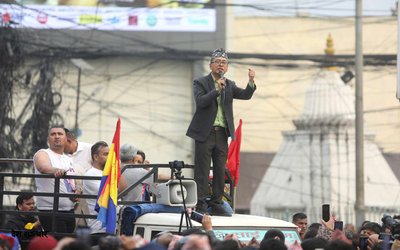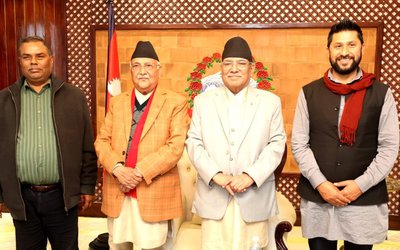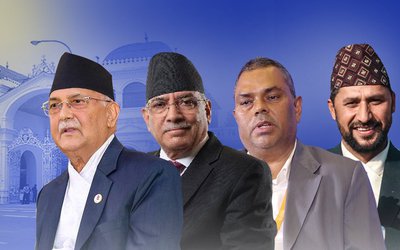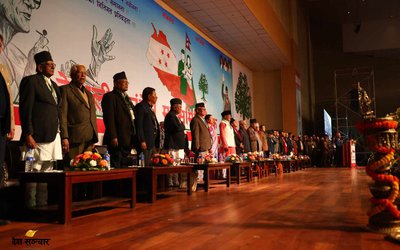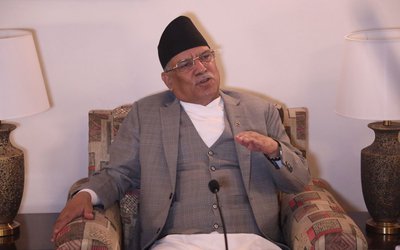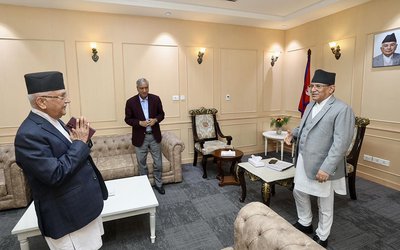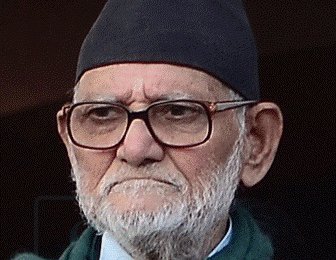
Prime minister Sushil Koirala has left for New York following the extension of the tenure of the Constitutional Political Dialogue and Consensus Committee (CPDCC) by Constituent Assembly for two weeks, but political tensions continue to simmer beneath the carpet.
As the main opposition UCPN-Maoist-led front continues to disrupt the normal functioning of the Legislature Parliament, the whole parliamentary process is in a limbo, including the discussion of national budget and some important bills. The UCPN-Maoist allies are demanding all powerful High Level Political Committee to guide the government or to give them space in the cabinet. This is likely to create more financial and political problems in the coming days.
Uncertainty does not end here. Even after twenty days of extension of the tenure of CPDCC, it is unlikely to see any consensus on thorny issues like federal structure, form of government and structure of judiciary, given the divergent views within the major political parties represented in the CA.
UCPN-Maoist led front of ethnic and Madheshi alliance in CA and CPN-Maoist led alliance of extreme left and ethnic parties have already made it clear that they will burn any draft of the constitution which rejects their demands. However, ruling Nepali Congress and CPN-UML have vowed to settle the disputed issues through voting in the Constituent Assembly. UCPN-Maoist led alliance in CA and CPN-Maoist led alliance outside the CA are likely to retaliate against any such move of NC and CPN-UML.
Likewise, the recent moves by prime minister Sushil Koirala and CPN-UML leaders, who have been harping on the slogan to promulgate the new constitution by February 2015, have deepened the distrust within the parties. Prime minister Koirala withdrew his move to reshuffle the cabinet at the last minute, desisting from asking three key ministers Dr. Minendra Rijal, Dr. Narayan Khadka and Chitralekha Yadav, representing other factions, to resign. However, it has widened the differences within the party factions. Likewise, CPN-UML’s decision to call back two ministers has also sparked controversies within the CPN-UML. Just a week ago, CPN-UML called back two of its cabinet ministers Bhim Acharya and Karna Bahadur Thapa. Both of them were directly elected members but they were replaced by two defeated personalities Mahesh Basnyat and Purna Chandra Amatya.
Although prime minister Koirala’s move to remove three ministers was foiled at the last minute and his whole plan to reshuffle the cabinet was averted for time being, the move deepens the distrust within the party leaders. All these decisions are likely to have major political implication in the coming days and they are likely to affect the constitution making process.
The dillydallying of UCPN-Maoist, CPN-Maoist and Madhesh based parties is understandable as they believe that the new constitution will not address their issues, including the identity based federal structure. They believe Nepali Congress and CPN-UML will take the credit for all the changes. However, the political moves taken by the ruling parties is beyond the comprehension.
The moves show that their actual priority is to remain in power. Promulgation of the new constitution as per the calendar of operations endorsed by the CA is a matter of least concern for all.
Parties took some positive moves as well. After nearly two years of disputes, the government finally recommended chairman and members of National Human Rights Commission. Former chief justice Anup Raj Upadhyaya and members, including former justice Prakash Wasti, Ram Kumar Sharma, Mona Ansari and human rights activist Sudip Pathak, are in the commission now. Formation of National Human Rights Commission is likely support the implementation of the transitional justice system which is of international concern.
As prime minister headed to New York, his last minute efforts to bring Maoists on board the constitution making process failed following their rejection to take part in the all-party meeting. It looks like the constitution writing process is now in a greater uncertainty than a while ago.
Likely scenario
As political misunderstandings and disputes at the interparty and intra-party levels continue, this is likely to invite unpredictable political situations. The rift between the ruling and opposition party will affect the search for consensus. Similarly, the failure to bring CPN-Maoist led radicals on board is likely to create more chaos in the streets. The disruption of the Legislature Parliament will delay the passing of the budget. This will affect the pace of development and government’s fiscal policy. Internal differences within the major parties are also likely to make the government dysfunctional. Since Nepal is going to be in the festive season, any major political move to end the deadlock in the Legislature Parliament is unlikely till the last week of October.
Implications to Development Projects
Nepal’s development projects are likely to suffer the most as the government is preoccupied with the political process and is less likely to pay attention to the country’s development. Delay in the release of the budget will hamper the completion of the projects in time. Implementation of new policies and programs will, therefore, be delayed.
Given the current political trends, no major breakthrough in changing the current political dynamic is likely. In case the two ruling parties make any attempt to use their majority power in CA, the UCPN-Maoist led alliance is likely to seize the CA and Legislature Parliament.

Keshab Poudel
Poudel is the editor of New Spotlight Magazine.
- IWMI: SoLAR Global Science-Policy Forum Conference
- Apr 25, 2024
- CLA: Samriddhi For Skill Development
- Apr 23, 2024
- ECONOMY: Growth At 3.3
- Apr 16, 2024
- DPM’s SHRESTHA’S CHINA VISIT High Profile, Low Key
- Apr 14, 2024
- Maha Kumbha In Barahkshetra: A Sacred Festival In Sacred Koshi (Kaushiki) River
- Apr 09, 2024

